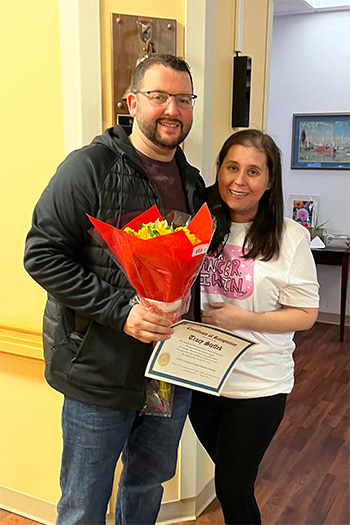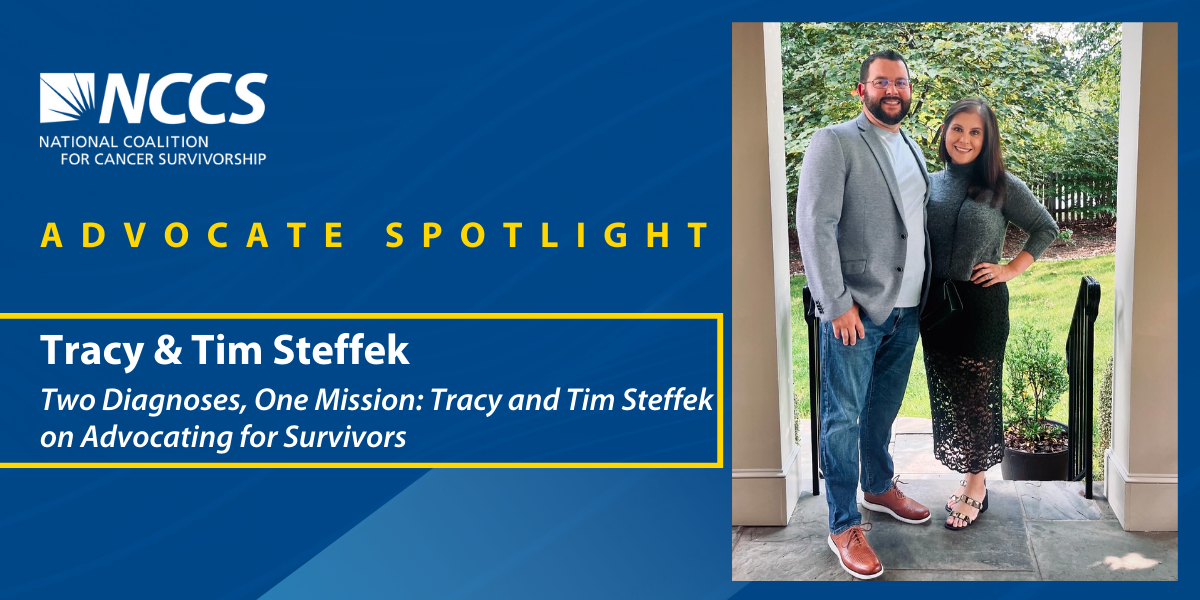Two Diagnoses, One Mission: Tracy and Tim Steffek on Advocating for Survivors
Advocate Spotlight: Tracy and Tim Steffek

When Tracy Steffek finally smiled again after losing half her tongue to cancer, it wasn’t just a physical triumph—it was a defiant reclaiming of identity, strength, and joy. “I was not letting cancer steal my smile,” she says. That moment—hard-won through months of surgeries, radiation, speech therapy, and unimaginable pain—embodies everything about Tracy and her husband Tim’s cancer experience: a story of unshakable determination, deep love, and a powerful commitment to making the path easier for others.
A Double Diagnosis and a Family Transformed
Tracy was 36, just four months postpartum with her second daughter, when she found a lump in her breast. Her OB-GYN initially thought it was a clogged milk duct, common in breastfeeding mothers. But Tracy trusted her instincts—and that decision likely saved her life. She was diagnosed with Stage 1B invasive ductal carcinoma and soon underwent a lumpectomy, chemotherapy, and, later, a double mastectomy with reconstruction. With no family history of cancer, she also learned she carried a BRCA2 variant of uncertain significance.

Almost exactly one year later, a small spot on her tongue—initially dismissed as a lingering side effect of chemotherapy—was confirmed to be Stage 2 non-HPV tongue cancer. The second diagnosis came just as her family had begun to exhale. “We were exhausted,” she said. “We finally could put this chapter behind us. Then, tongue cancer hit us like a ton of bricks.”
The treatment was grueling. Tracy underwent a Hemiglossectomy—a complex surgery that involved removing half of her tongue to eliminate the cancer. To help her speak and eat again, doctors used tissue from her arm to reconstruct the missing portion. She also had 42 lymph nodes removed from her neck, received additional grafts from her thigh to repair the donor site on her arm, spent time in the ICU with a tracheostomy and feeding tube, and endured the physically and emotionally taxing process of head and neck radiation.
But even in the face of so much physical and emotional trauma, she remained steadfast in her mission: “I was determined to be home for the holiday with my girls,” she said, reflecting on the December hospital stay. “I knew I had to do whatever I needed to be around for my girls.”
Listening to Her Body—and Her Soul

Tracy attributes her survival and strength to several factors: her fierce self-advocacy, an incredible care team, and the steadfast presence of Tim, her husband of 15 years. “He was my greatest caregiver and partner,” she says. “He supported my decisions, encouraged me, advocated when I couldn’t, and helped hold our family together.”
Her children, now 3 and 8, were also central to her journey. From ensuring their lives remained joyful—even in the midst of hospital visits and surgeries—to gently fielding their tender questions about scars and illness, Tracy and Tim prioritized the emotional wellbeing of their daughters throughout. “Just this last week, [my youngest] asked if she had made me sick,” Tracy shared. “That’s a conversation we’ll revisit again and again in survivorship.”
From Patient to Advocate
Tracy didn’t initially plan to become a cancer advocate. “At first, I tried to keep my diagnosis private,” she says. But the visible impacts of her treatment made hiding it impossible. Slowly, she leaned into her story. With a professional background in public policy, she began to see how her skills could help bridge the gap between cancer care and the systems that so often fail patients.
Today, she serves on the Parent Advisory Board for Bright Spot Network and co-facilitates a monthly Healing Circle for Parents with Cancer, a collaboration with the Smith Center for Healing and the Arts. She has shared her story with ASTRO to raise awareness about radiation treatment and engaged with national organizations, like Bag it For Cancer at their Escape to Thrive Leadership Conference and Young Tongues, a global community goal offering peer support. Alongside her advocacy, she continues to work as a Senior Director at a nonprofit focused on substance use and mental health, while also caring for her grandmother.
In 2023, Inova Life with Cancer honored the Steffek family, a moment Tracy describes as deeply meaningful. “It was such a heartwarming and celebratory occasion to jointly recognize so many of the providers that walked this journey with me,” she said.

Tracy’s advocacy work is not done alone. Tim supports her behind the scenes and occasionally joins her at events. While this is her story, they have walked every step of the path together.
Advocacy with Impact

Through her involvement with the National Coalition for Cancer Survivorship (NCCS), Tracy has taken her advocacy to the next level. As a member of the Cancer Policy and Advocacy Team (CPAT), she’s attended roundtable discussions with policy leaders, researchers, and clinicians. “Not only do I learn so much that makes me a more effective advocate,” she says, “but I get so inspired being in the room with people who are united around improving cancer care.”
She credits NCCS for equipping her with the knowledge and tools to show up prepared for Hill Day and policy conversations, and for providing a platform where survivors’ stories fuel meaningful policy change. “NCCS brings together the diverse stories of cancer survivors and ensures those stories are heard where it matters most.”
Looking Ahead: The Unconquerable Soul

While Tracy is now declared No Evidence of Disease (NED), the physical and emotional healing continues. She lives with long-term effects—nerve damage, mobility limitations, early menopause, and lingering trauma. But she remains focused on whole-person healing and systemic change. She dreams of a future where integrated, values-based care is the norm and where no survivor has to beg their insurance company for coverage.
She also advocates for parents navigating cancer, often underrepresented in the survivorship landscape. “The long-term trauma of parenting through cancer is immense,” she said. “We need resources that address maternal mental health, child development, and the entire family unit.”
Asked what keeps her going, Tracy quotes from the poem Invictus:
“Out of the night that covers me,
Black as the Pit from pole to pole,
I thank whatever gods may be
For my unconquerable soul.”
“Cancer took a lot away from me,” she says, “but it will never be able to take away my soul.”
Tracy encourages others to find their niche in advocacy, no matter how small it might seem. “Just start somewhere. Your story, your experience—it’s valid and it’s powerful. This work helps open the door to conversations that change lives. No one should have to navigate cancer, or survivorship, alone.”
Together, Tracy and Tim remind us that advocacy doesn’t begin with policy—it begins at home, in the quiet courage to show up, speak out, and believe that something better is possible.
Learn more about NCCS’s CPAT program for advocates and join for free.




